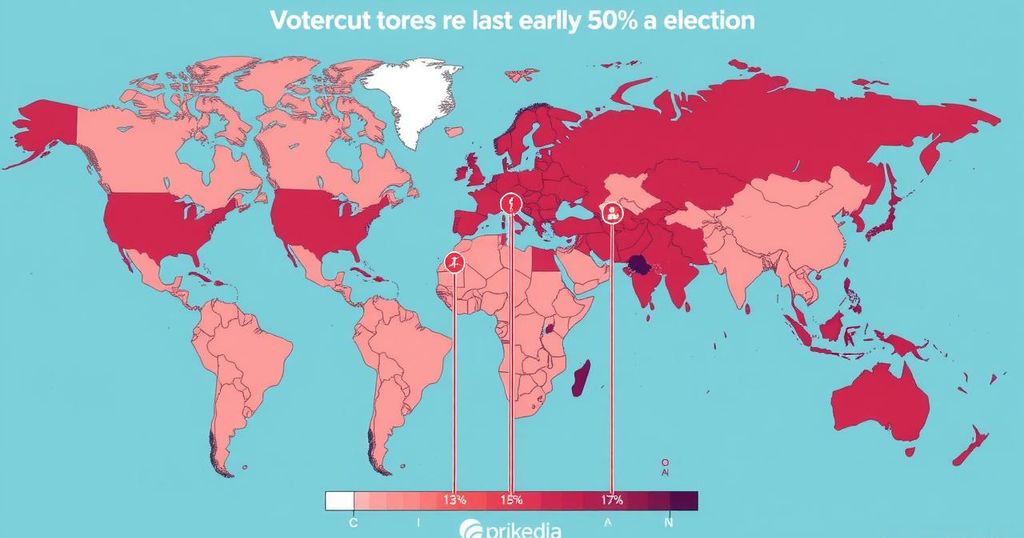Global Democracy in 2024: A Year of Historic Elections and Economic Appeal

In 2024, over 60 countries, representing nearly half of the global population, held elections, marking a historic moment for democracy. Despite this, voter behavior revealed a focus on economic self-interest over collective welfare, as incumbents faced severe backlash in many regions. Significant changes in leadership occurred due to economic disenchantment, while authoritarian practices were highlighted through events like Putin’s election. Overall, the results reflect complex dynamics affecting global political landscapes.
The year 2024 witnessed a historic wave of electoral engagement, with over 60 nations, representing nearly half of the world’s population, participating in democratic processes. This unprecedented phenomenon revealed important insights into the state of global democracy. However, voter decisions appeared driven largely by immediate personal interests rather than collective welfare, as evidenced by a prioritization of economic issues over pressing global challenges like climate change.
In major economies, such as the United Kingdom, economic anxieties overshadowed long-term concerns. Keir Starmer’s Labour Party successfully capitalized on these sentiments, ending years of Conservative dominance. Similarly, in the United States, President Biden, despite reducing inflation, faced voter backlash amid stagnant wages and rising costs, facilitating Donald Trump’s return to power.
Across the globe, incumbent leaders, including PM Narendra Modi in India and President Emmanuel Macron in France, experienced significant electoral losses driven by dissatisfaction over economic results. In South Africa, the ANC lost its majority for the first time since Mandela’s era, signaling a shift away from established political norms. While some regions saw continued electoral engagement, others, such as Bangladesh, demonstrated instability where protests overshadowed the electoral process.
A particularly salient narrative emerged with Vladimir Putin’s overwhelming electoral victory in Russia, which underscores the disparity between democratic ideals and authoritarian practices. His grip on power highlighted the potential for corruption in electoral processes and the vital importance of a free press. The juxtaposition of Trump’s election alongside Putin’s revaluation poses critical implications for global stability, particularly regarding ongoing conflicts like that in Ukraine.
The 2024 elections revealed that the electoral choices reflect broader societal trends, often dictated by economic pressures. As nations navigate turbulent waters, the collective lessons from this electoral wave are profound, suggesting a need for introspection and perhaps a renewed commitment to democratic values.
The article provides a comprehensive analysis of the global electoral landscape in 2024, detailing the unprecedented participation in democratic elections across over 60 countries. It delves into the motivations behind voter choices, highlighting the prevalence of immediate economic concerns over broader societal issues, such as climate change. The analysis also covers the electoral outcomes for key political leaders worldwide, examining how discontent with incumbents has influenced results in both established democracies and authoritarian regimes. By doing so, the text underscores the intricacies of global democracy in an environment where economic factors often shape political landscapes.
In conclusion, the elections of 2024 exemplified the complex relationship between economic conditions and voter behavior across the globe. While many nations embraced democratic processes, the choice of leaders revealed a tendency towards self-interest and immediate concerns rather than long-term benefits. The ramifications of these elections not only affect national landscapes but also have the potential to shape global politics significantly, highlighting the importance of maintaining democratic principles amidst rising challenges.
Original Source: edition.cnn.com






